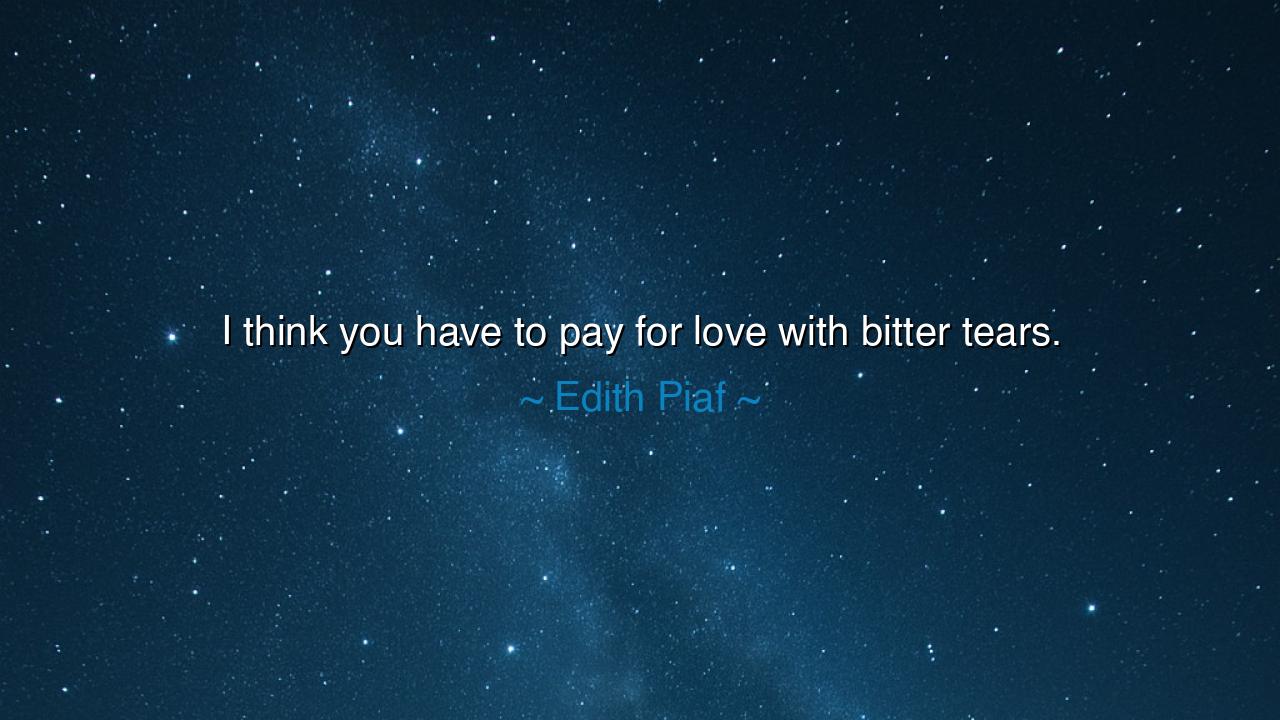
I think you have to pay for love with bitter tears.






"I think you have to pay for love with bitter tears." — thus spoke h Piaf, the Little Sparrow of France, whose songs carried both the joy and the anguish of the human heart. In this short but piercing confession lies the voice of a woman who lived, loved, and suffered with unflinching intensity. Piaf’s words are not a lament but a truth — the kind of truth that only those who have tasted both ecstasy and despair can utter. She tells us that love, the most beautiful gift of life, is never free. It demands from us our tenderness, our courage, and, often, our pain. It gives us wings, yes, but they are wings earned through tears.
To pay for love is not to suggest that love is a transaction, but rather that it is a sacred exchange — a giving of the soul. Love opens the heart, and in doing so, exposes it. Every great love carries within it the shadow of loss, the fear of betrayal, the ache of separation. Those who love deeply cannot escape suffering, for to love another being is to surrender control, to make oneself vulnerable to fate. Piaf, who loved as fiercely as she sang, knew that tears are the price of passion, and that the heart that never weeps has never truly lived.
The origin of this quote rises directly from Piaf’s own life — a life of triumph and tragedy intertwined like melody and harmony. Born into poverty, abandoned by her mother, raised in hardship, she found solace only in song. Yet even as fame lifted her from the streets of Paris to the grandest stages of the world, love remained her greatest teacher and her greatest torment. She lost the love of her life, the boxer Marcel Cerdan, in a plane crash at the height of their romance. It was said that she never recovered from that blow, though she continued to sing, pouring her grief into every note. Her haunting anthem, La Vie en Rose, and her lament, Non, Je Ne Regrette Rien (“I regret nothing”), are not contradictions, but two faces of the same truth — that love and pain are inseparable.
To weep for love is not a mark of weakness, but of depth. The ancients knew this well. Consider Cleopatra, queen of Egypt, whose love for Mark Antony defied empires and reason alike. She paid for that love not only with her crown but with her life. Or recall Romeo and Juliet, whose love bloomed so brightly that it burned away their youth in tragedy. Such stories endure because they speak to something eternal — that the greater the love, the greater the sorrow it risks. For love stretches the soul to its limits, and when it is torn away, it leaves behind an echo that can only be answered by tears.
Piaf’s wisdom is not one of despair, but of acceptance. She does not tell us to avoid love in order to escape pain. Instead, she urges us to embrace it — to accept the tears as part of the sacred cost of living fully. Just as the rose cannot bloom without the thorn, the heart cannot know love without the risk of breaking. The one who seeks love without suffering seeks sunlight without warmth, or music without sound. To love is to risk pain — but to live without love is to die in silence.
There is a quiet heroism in this kind of acceptance. The lover who has wept yet continues to love, who has fallen yet dares to rise again, becomes greater than they were before. Every tear shed for love polishes the soul until it gleams with compassion and understanding. For when we suffer for love, we learn empathy; when we lose love, we learn gratitude for what was; and when we love again, we do so more wisely, more gently. The tears that Piaf speaks of are not the tears of defeat — they are the baptism of the heart, cleansing us of selfishness and pride, and preparing us to love more purely.
So let this be the lesson: Do not fear to pay the price of love. Let your heart break, and let it heal. Do not close yourself to the possibility of pain, for in pain there is proof that you have lived truly. When love ends — whether through distance, betrayal, or death — grieve it fully, and then give thanks that you were chosen to feel it at all. The tears you shed are not wasted; they are the offering that keeps love sacred.
And when you think of Piaf’s words, remember her voice — fragile yet fierce, trembling with sorrow yet alive with hope. For she, more than most, understood the paradox of love: that it wounds and heals in the same breath, that it breaks us only to make us whole. To love deeply is to stand before life unguarded, knowing you will bleed — and still, to whisper, “Yes.” That is the price of love. And though it may be paid in bitter tears, it is the only currency that buys eternity.






AAdministratorAdministrator
Welcome, honored guests. Please leave a comment, we will respond soon